Volvo Penta’s powertrain development bench is deep
06 December 2023
Volvo Penta taps into global resources to tailor powertrain designs for the application
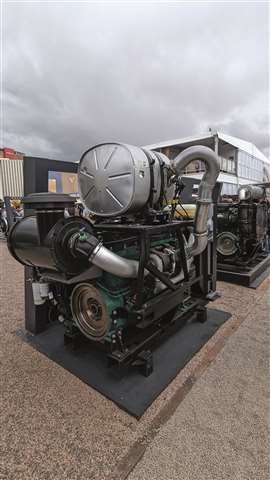 The Volvo Penta stand during ConExpo-Con/Agg in March 2023. (Photo: Chad Elmore)
The Volvo Penta stand during ConExpo-Con/Agg in March 2023. (Photo: Chad Elmore)
Now more than ever, selecting the right powertrain components for an application must involve each stake holder – from the end-user to the OEM to the distributor to the supplier of the components and technology – at the beginning.
For Volvo Penta of the Americas, that includes leveraging the technology and investments from Volvo Group, including Volvo Trucks, Volvo Buses and Volvo Construction Equipment.
“In many cases, customers rely on us to guide them, and we do that through dialogue and collaboration – we’re not going to dictate one path,” said Fredrik Högberg, president of Volvo Penta, Chesapeake, Va. He joined the Volvo Group in 1994. Following leadership positions in Sweden, Australia, China, and most recently in North Carolina for Volvo Trucks North America, he was named president in 2022.
“The strength we have from being part of the Volvo Group is unparalleled,” he said. “We have access to the biggest library I’ve ever seen, and finding the right solution means first gathering all of the right books.”
If Volvo Group can be seen as a giant library, then the company’s stands at major trade shows in the U.S. throughout 2023 could be considered a bookmobile of sorts, giving visitors a glimpse into what is possible.
E-powertrain books
During AEM’s ConExpo-Con/Agg, Volvo Penta displayed its electromobility solutions alongside its current portfolio of Stage 5 and Tier 4 final internal combustion engines – the D5, D8, D13 and D16.
“Our message at ConExpo was that we will meet you where you are, wherever you are on your journey” said Darren Tasker, vice president of Industrial Sales, Volvo Penta of the Americas. “If you want to start looking at new technologies now, we’ve got them. If you’re in the traditional technology, we’ve got that, too.”
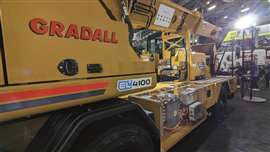 Gradall looked to Volvo Penta to help electrify one of its excavator models. (Photo: Chad Elmore)
Gradall looked to Volvo Penta to help electrify one of its excavator models. (Photo: Chad Elmore)
The company’s engines and battery solutions could also be seen installed in machines on the stand of Ohio-based manufacturer Gradall Industries Inc. Volvo Penta’s partnership with the OEM began in 2014 when it became its exclusive supplier of 5 and 8 L Tier 4 final diesel engines for telescopic boom excavators. In Las Vegas, Gradall unveiled an electric version of its highway speed wheeled excavator. The zero-emissions concept machine drove onto the show floor powered by two Volvo Penta batteries as well as its electric motors, gearboxes, inverters, junction boxes and cabling. The company said Volvo Penta’s complete system approach helped make it possible to develop a running prototype in a matter of months.
Several weeks later, Volvo Penta was at the Anaheim Convention Center in California for Advanced Clean Transportation Expo, where its electric driveline could be seen just a few yards from TICO, an early adopter. The companies began their collaboration in March 2021. TICO’s latest terminal tractor integrates a Volvo Penta electric driveline, batteries and e-accessories. The Pro-Spotter Electric tractors have been successfully tested and evaluated by customers, and production is ramping up at TICO’s Ridgeland, S.C., factory.
“When it comes to electromobility, we tailor the solutions — not only the power — to optimize the application we’re targeting,” said Högberg. “We do that today with the combustion engine, and I think it’s going to be even more important in the future with digitalization and electrification.”
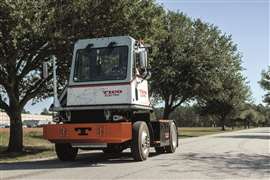 TICO’s terminal tractor. (Photo: Volvo Penta)
TICO’s terminal tractor. (Photo: Volvo Penta)
“The market is also moving quickly,” said Tasker. “The batteries we have introduced are already two generations down the road. With our focus as an organization, we can add value to external, smaller organizations by tapping into the development that’s going on within the Volvo Group. And that’s not static. We’re having discussions about not just the next generation of batteries, but the one after that. it’s moving very fast now, and I think that adds to our partnership with customers.
“The devil is in the detail with these new technologies, as well. There are lots of companies that offer batteries, but having a battery system that will work in a wide range of different applications is much more demanding.”
While Volvo Penta benefits from the larger group, Tasker said it goes both ways. “We are also contributing to the Volvo Group. Volvo Penta’s work on applications help improve the products the group offers, and there is some volume contribution, as well. The 16 L engine, for example, is a very strong engine for Volvo Penta, and I think we take as many as the Volvo Group.”
Engine books
Engines will continue to be important to Volvo Penta’s future goals around the world.
“I believe the diesel engine will have a long life, but in specific segments and specific geographies,” said Högberg. “We, as Volvo Penta and the Volvo Group, will continue to invest in both traditional combustion engines and future technologies. Having said that, however, the internal combustion engine is not necessarily going to be only diesel. It could run on diesel and other alternative fuels that we’re testing.”
“We know that not all technologies are suitable for all applications, so we need to be ready with multiple approaches,” said Tasker. “We know there are certain applications where you just cannot get enough charge on board to run in the middle of a forest for several days. We’re working with renewable natural gas, and we’ve got renewable diesel. Hydrogen is becoming a stronger part of our portfolio, from a fuel cell perspective and as internal combustion engine fuel.”
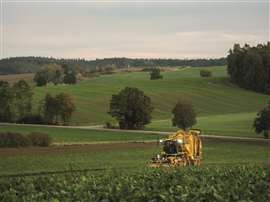 Volvo Penta provided a 16 L diesel engine for ROPA’s latest sugar beet harvester. (Photo: Volvo Penta)
Volvo Penta provided a 16 L diesel engine for ROPA’s latest sugar beet harvester. (Photo: Volvo Penta)
For example, Volvo Penta has worked with family-owned harvester manufacturer ROPA Maschinenbau GmbH for three decades. When the German OEM developed the Tiger 6S, which it said is one of the largest and most advanced sugar beet harvesters in the world, Volvo Penta developed a variation of its 16 L diesel engine to help the company meet EPA Tier 4 final and EU Stage V emissions regulations.
The result was the Volvo Penta D16 TWD1683VE, an inline six-cylinder engine with dual turbochargers rated 796 hp (585 kW). It delivers high torque at a low engine speed, which the company said is necessary for harvesting beets – in the 1,000 to 1,100 rpm range, the engine generates 3,550 Nm (100 Nm below maximum torque). A typical day for the Tiger 6S involves harvesting up to 2,200 tons of sugar beets during a tight harvesting window.
“During ConExpo, we had customers asking us, ‘are you guys gonna still sell engines?’ The questions were nonstop,” said Matt Reeves, director, Industrial Sales, Volvo Penta of the Americas. “It was a good reminder that while much of our global marketing talks about the electric driveline and other alternative solutions, we have to make sure they understand that we’re not moving away from diesel. We are committed to maintaining our diesel engine position and our strength in these markets. Luckily, that’s what customers want so far. As exciting as this new technology is, the reality is that it’s not going take shape for another five or six years. That’s the time we’ll need for the infrastructure, to have truck charging stations on every other corner or ready to charge harvesters out in the field.”
Aftersales support books
It’s not only the product development teams that can benefit from lessons the Volvo Group has learned over the years, said Högberg. “When we discuss the service side of these electric drivelines, it’s not the same as it was for a diesel engine. You can’t have the same mechanic going after the battery and trying to fix it with a wrench. It can be dangerous. So, we also must provide training for EV certification, and that will be expanded to alternative fuels in the future. We have that knowledge inside the group and through our partners.”
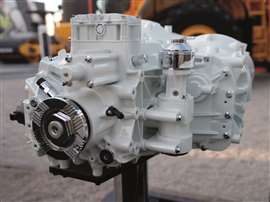 An electric driveline available through Volvo Penta. (Photo: Volvo Penta)
An electric driveline available through Volvo Penta. (Photo: Volvo Penta)
“A huge benefit that we have is that level of expertise we’ve gained from the truck and bus organizations, especially in Europe,” said Reeves. “On the bus side, we’ve been in electric buses since I was a kid growing up in Switzerland. I remember the arms that went to the overhead wires to keep the bus going. That technology has evolved from the 1970s to today. It’s in a bit of a different fashion now, of course, but that is the expertise that we have as Volvo Penta being a part of the Volvo Group.”
The work that is required to ensure battery electric vehicles will support OEMs and end users has created some surprising teams.
For example, Milence, the joint venture established in 2022 by Daimler Trucks, Traton Group and Volvo Group, plans to build and operate 1,700 high-capacity public charging points in Europe by 2027.
“We signed the agreement with Daimler and Traton, our fierce competitors, and we did it for the good of the work,” said Högberg. “Partnerships like that were unheard of five years ago, and such partnerships will be extremely important in the future. As it happens, this one is for the on-highway business. Can we set up a partnership in the future for industrial? Most likely, and now we have a template for that purpose.”
STAY CONNECTED




Receive the information you need when you need it through our world-leading magazines, newsletters and daily briefings.
POWER SOURCING GUIDE
The trusted reference and buyer’s guide for 83 years
The original “desktop search engine,” guiding nearly 10,000 users in more than 90 countries it is the primary reference for specifications and details on all the components that go into engine systems.
Visit Now
CONNECT WITH THE TEAM










